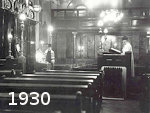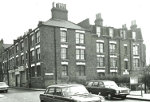

All but one (see here) were Orthodox and Ashkenazi in their foundation and ritual. This was for two reasons: primarily because most of the settlers were from Eastern Europe, but also because the establishment of Sephardic synagogues in the area was inhibited by the presence of the historic Bevis Marks synagogue on the edge of the City, representing a somewhat different style of Jewish life, which reacted nervously to the new influx. (This is the oldest synagogue in England, built in 1701 and designed by the Quaker Joseph Avis who had worked with Wren, so its style is not unlike that of Anglican and nonconformist churches of the period - deliberately so, both since this was the prevailing architectural style and also because they did not wish to draw attention to themselves. It is tucked off the main street, since at that time Jews were not permitted to build on main thoroughfares. Benjamin Disraeli's family had been members here, before a dispute which led to the children being baptized as Christians - which in due course enabled him to serve as prime minister.) Apart from the divisions between Sephardi and Ashkenazi Jews, there were tensions between the various, very different immigrant groups: for example, urban Jews from Kiev, Ukrainian farmers, those from small Galician (Austrian) towns and those from Polish ghettoes.
Willy Goldman (1910-2009), who grew up near the St George-in-the-East district and wrote East End my Cradle in 1940 and several other books about East End life, said that Rumanian and Polish Jews mutually regard each other as God's lowest creation. As one who largely rejected his religious heritage, he also wrote We Jewish children acknowledged the superiority of the Gentiles' method in one field: religion. He was practically exempt from it. With us the Rabbis dominated one part of our life as the school-teacher dominated the other. Most of their teaching, he reckoned, would have been forgotten within a week of barmitzvah.... But other East End Jewish writers (of which there are many) have a different take: Emanuel Litvinoff (1915-2011), for example, did not have a bar mitzvah because his father returned to Russia and his mother could not afford it: see Journey Through a Small Planet (1972).
The oldest congregations in this area were on the edge of, or just within, the City, in what became the parish of St Mark Whitechapel, many of whose late-19th century clergy were actively involved in Christian-Jewish mission, but which closed a generation later for lack of a local Christian population. Here are details of several Jewish convert clergy who served at St Mark's and at Christ Church, Watney Street.
In 1887
the Federation of Synagogues was established on the initiative of Samuel Montagu MP [see above] who was concerned by the spread of worship
in small, unregulated and often insanitary premises. (It also ran a burial society, with an office at 45 St Mark's Street). Those marked (1)
in the second column of the table below were represented from the time of the preliminary meeting on 16
October 1887, those marked (2) from its official launch on 6 November
1887, and
those marked (3) affiliated later. The title 'Great' does not mean that
they were grand buildings - most were not - but rather that they were
purpose-built amalgamations of small synagogues which previously met in
homes or converted workshops.
In
time, all those in the parish closed, amalgamating with other
congregations, both local and further afield. A few remain on its
borders - Nelson Street, Commercial Road and Fieldgate Street
–
but they are struggling to survive. However, they are actively involved in interfaith activity, through Tower Hamlets Interfaith Forum - (especially by the wonderful and ever-helpful Leon Silver,
warden of Nelson Street) and an increase has been noted in young Jewish
professionals living in the 'City Quarter' attending daily prayers.
The
synagogues are listed in
historical order of foundation.
| founded |
affiliated |
name |
address |
subsequent history |
| 1747/8 [a] |
1 |
Prescot Street Synagogue pre-1870s: Love and Kindness Chevra (Chevra Ahavat v'Chesed), originally Rosemary Lane congregation - Mahazike Torah |
Prescot Street (or Great Prescott Street), Goodman's Fields pre-1870s: Rosemary Lane (now Royal Mint Street) |
closed between 1887 and 1896 |
| 1792 [a] |
1 |
Scarborough
Street
Synagogue previously The Gun Yard, or Gun Square, 'Polish' Synagogue |
Scarborough Street, Goodman's Fields - until 1870s: Mansell Street; originally Guy Yard, or Square, Hounsditch | closed 1920s |
| c1840 |
a private minyan |
Moses Moore's Synagogue |
66 Mansell Street |
closed late 19th century |
| pre-1870 |
not known |
Flasch's Synagogue (or Flasch's Congregation) | Mansell Street |
closed |
| pre-1870 |
not known |
Mansell Street Synagogue (Zussmann's Synagogue) | Mansell Street |
closed |
| 1880s |
1 |
Peace & Tranquility Chevra (originally Mansell Street Synagogue, then Buckle Street Synagogue | Mansell Street, then Buckle Street (off Leman Street) |
closed pre-1918 |
| 1881-87 |
1 |
(United) Kalischer Synagogue, or Kalischer Chevra | St Mark's Street |
closed by 1896 |
| pre-1887 |
2 |
Lodzer (the Lodz)
Synagogue probable successor to Bikkur Cholim Sons of Lodz Chevra |
80-81 Davis
Mansions, New Goulston
Street (previously Newcastle Street) |
merged c1934 with Lubiner to become Lubmer & Lomzer (Lubimer & Lodzer) Synagogue; closed after 1947, joined Fieldgate Street Great Synagogue |
| 1895 |
3 |
(Great) Alie Street Synagogue |
41 Alie Street (formerly 40/41 Great Alie Street) | closed 1969,
joined Fieldgate
Street Great Synagogue, which in turn closed 2007 |
| 1895 [b] |
3 |
Cannon Street
Road Synagogue |
143-145 Cannon Street
Road |
closed 1970s, joined East London Central Synagogue (Nelson Street) |
| 1898 | 3 at times, and also to the Adath Yisroel Burial Society of the Union of Orthodox Hebrew Congregations |
Commercial Road
Talmud Torah
Synagogue |
9-11 Christian Street | closed some time between 1930 and 1980 (reports vary), and now based at 153 Stamford Hill N16 since 1980 the site has housed Markazi Masjid mosque |
| 1902 |
independent, later 3 |
Shadwell and St.
George's
Synagogue (Chebrah Torah & Bikkur Cholim) |
191 The Highway (previously 59 St George Street) |
closed c1951 |
| pre-1905 |
3 |
Buross Street Synagogue | 47a Buross Street, Commercial Road | closed pre 1956, joined East London Central Synagogue (Nelson Street) |
| pre-1906 |
3, later independent |
Sander Street Synagogue |
2 Sander Street |
closed after 1947 (50 members in 1905, 70 in 1915) |
| pre-1915 [c] |
3 |
Commercial Road [Beltz] Synagogue |
90 Commercial Road (corner of Berner [Henriques] Street |
linked in some way with Plotsker
Synagogue [below]; now joined with East London Central Synagogue (Nelson Street) |
| pre-1915 |
3 |
Neshelska Synagogue | Lawrence Buildings, Cannon Street Road | closed 1920s |
| pre-1915 |
3 |
Little Alie
Street Synagogue (New
Synagogue) (formerly Zoar Baptist Chapel) |
Little Alie Street |
closed 1920s |
| pre-1919 |
3 |
Lubiner (the
Lublin) Synagogue |
3 Lawrence
Buildings, Cannon Street Road, |
merged c1934 at this address with Lodz to become Lubmer & Lomzer (Lubimer & Lodzer) Synagogue; closed after 1947, joined Fieldgate Street Great Synagogue |
| pre-1919 |
3 |
Plotsker Synagogue |
45 (previously 90?) Commercial Road | closed pre-1930 |
| pre-1919 | 3 |
Stertzover Synagogue |
15 Fenton Street, Commercial Road |
(84 members in 1919) closed post-1956 |
| 1920 |
3 |
Commercial Road Great Synagogue |
262 Commercial Road |
closed 1969, joined East London Central Synagogue (Nelson Street) |
| pre-1930 |
3 |
B'nai Brichtan (Sons of Brichtan) Synagogue | 23 Bromehead Street | closed 1952, joined East London Central Synagogue (Nelson Street) |
| pre-1930 |
3 |
The Rumanian Synagogue |
6/7 Christian (previously Matilda) Street | closed after 1947 |
| pre-1930 |
3 |
Grove Street (Great) Synagogue | 96 Golding (formerly Grove) Street | closed after 1949, joined East London Central Synagogue (Nelson Street) |
| 1930s |
Union of Orthodox Hebrew Congregations | Special Verein (Society) Bikur Cholim | 39 Harris
Buildings, Burslem Street [d] |
closed c1948 |
| 1930s |
Union of Orthodox Hebrew Congregations | Hebrew Centre Synagogue | 74 Jane Street |
closed 1940s |
| ??? |
Philip Street - independent (with burial rights West End Great Synagogue, Soho), then 3 as... |
...Philip Street & Shadwell Synagogue |
25 Philchurch (formerly Phil[l]ip) Street, Backchurch Lane |
closed after 1956 |


 [b] pictured inside in 1930, and site today; also Chazan (cantor) Halter with his pupils. There had also been a
Kurland Synagogue at 133 Cannon Street Road [now part of City Wellbeing Practice], not recommended for
inclusion in the Federation because it had no accommodation for women
and no fire exit; in 1946 LBM took a 99-year lease on the premises to
establish, or perhaps continue an existing, mikveh
(ritual bathing
place for women).
[b] pictured inside in 1930, and site today; also Chazan (cantor) Halter with his pupils. There had also been a
Kurland Synagogue at 133 Cannon Street Road [now part of City Wellbeing Practice], not recommended for
inclusion in the Federation because it had no accommodation for women
and no fire exit; in 1946 LBM took a 99-year lease on the premises to
establish, or perhaps continue an existing, mikveh
(ritual bathing
place for women). d] right is Harris Buildings, on the corner of Golding and Burslem Streets, in 1970.
d] right is Harris Buildings, on the corner of Golding and Burslem Streets, in 1970.